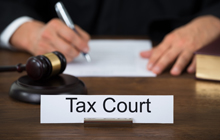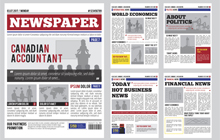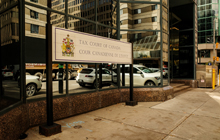The Queen v Paletta – The legal test for business income

Tax lawyer and accountant David J. Rotfleisch on the CRA's successful appeal of a Tax Court of Canada ruling regarding foreign currency trading
Introduction
Tax Court of Canada ruled Taxpayer’s trading activities designed to avoid tax constituted a business
 |
David J Rotfleisch, CPA, JD is the founding tax lawyer of Taxpage.com and Rotfleisch & Samulovitch P.C., a Toronto-based boutique tax law corporate law firm. |
In the Queen v Paletta, 2022 FCA 86, the Canada Revenue Agency (CRA) appealed the Tax Court of Canada's decision regarding appeals from reassessment for the taxation years 2000 to 2007 of Mr. Pasquale Paletta (the "Taxpayer"). (Mr. Paletta passed away a few months before his appeal to the Tax Court of Canada could be heard. The appeal was continued by his estate and heard over a period of eighteen days.) During these years, the Taxpayer entered into year end foreign-currency straddle contracts to simultaneously buy and sell the same amount of foreign currency at different but closely proximate dates in the future, which allowed him to realize a loss in the first year and a corresponding gain in the subsequent year.
In 2014, the CRA issued reassessments that denied the Taxpayer's trading losses for the 2000 through 2006 taxation years and assessed the Taxpayer for the 2007 taxation year that denied the loss carry-over of prior years' losses. Although the Tax Court of Canada found that the Taxpayer had no intention to earn profits and that his trading activity was solely designed to ensure immediate loss realization and indefinite gain deferral for tax purposes, it ruled that the Taxpayer's trading activities gave rise to a business. The CRA then appealed to the Federal Court of Appeal, which eventually set aside the Tax Court's decision and sided with the CRA.
Tax issues in dispute
The CRA specifically raised two issues in its appeal to the Federal Court of Appeal:
Whether the Tax Court erred in ruling that the Taxpayer's trading activities gave rise to a source of income in the form of a business despite having found that the trades were not made for profit, and
If so, whether the CRA could reassess the years in issue beyond the normal reassessment period and apply gross negligence penalties under the Income Tax Act.
A view for profit is required for business income
The Federal Court of Appeal identified the legal principles regarding business income and found that the Tax Court made a mistake in concluding that the Taxpayer's trading activities gave rise to a business. The two-step legal test regarding business income was set out by the Supreme Court of Canada (SCC) in Stewart v Canada, 2002, SCC 46, [2002] 2 SCR 645:
Is the activity of the taxpayer undertaken in the pursuit of profit, or is it a personal endeavour?
If it is not a personal endeavour, is the source of income a business or property?
Where the activity contains no personal element and is clearly commercial, no further inquiry is necessary.
Although the Tax Court of Canada reasoned that it was bound by the Stewart test to find the Taxpayer's trading activities constitute business losses due to its commercial nature, the Federal Court overruled this decision because the pursuit of profit is a prerequisite for the existence of a business, but the Taxpayer's activities were solely designed for tax avoidance.
The Federal Court also rejected the argument raised by the estate of the Taxpayer that the Supreme Court of Canada decision in Walls v Canada, 2002 SCC 47, [2002] 2 SCR 684 indicated an activity that is solely devoted to the reduction of one's tax is a business for the purpose of the Income Tax Act. The Federal Court differentiated the facts in Walls and this case and found that the transactions in Walls were not exclusively tax-motivated, therefore it left ample room for the SCC to conclude there was a business.
The statute-barred years can be reopened due to gross negligence
In order to reopen the statute-barred years, it must be shown that the Taxpayer made a misrepresentation that is attributable to neglect, carelessness or willful default under subparagraph 152(4)(a)(i).The CRA also imposed gross negligence penalty under subsection 163(2) of the Income Tax Act because the sole purpose of the Taxpayer's activities was to avoid tax and no experienced business person in the Taxpayer's position could reasonably believe the trading activities gave rise to a business. The Federal Court reviewed case law and clarified the standard of willful blindness and gross negligence by referring to the decision in Wynter v Canada, 2017 FCA 195:
- Wilful blindness will impute knowledge to a taxpayer who, in circumstances that suggest inquiry should be made, chooses not to do so. The knowledge requirement is satisfied through the choice of the taxpayer not to inquire, not through a positive finding of an intention to cheat;
- Gross negligence is distinct from willful blindness. It arises where the taxpayer's conduct is found to fall markedly below what would be expected of a reasonable person. Simply, if the wilfully blind taxpayer knew better, the grossly negligent taxpayer ought to have known better.
In summary, gross negligence imposes a higher threshold and conduct that justifies the imposition of a gross negligence penalties under subsection 163(2) will necessarily meet the threshold of negligence under subparagraph 152(4)(a)(i). The Federal Court found that the Taxpayer and his son were both warned that their proposed tax shelter plan could be problematic. As knowledgeable businesspersons, they chose to ignore the risk rather than addressing it by obtaining a formal legal opinion. Accordingly, the court found the Taxpayer was indeed grossly negligent.
In this case, the Taxpayer intentionally made certain year-end straddle trades near the end of each taxation year covered by the reassessment to intentionally incur losses. However, the prerequisite for business income is that there must be a view for profit. Therefore, transactions made exclusively for tax-avoiding purposes do not give rise to a business.
David J Rotfleisch, CPA, JD is the founding tax lawyer of Taxpage.com and Rotfleisch & Samulovitch P.C., a Toronto-based boutique tax law corporate law firm and is a Certified Specialist in Taxation Law who has completed the CICA in-depth tax planning course. He appears regularly in print, radio and TV and blogs extensively.
With over 30 years of experience as both a lawyer and chartered professional accountant, he has helped start-up businesses, cryptocurrency traders, resident and non-resident business owners and corporations with their tax planning, with will and estate planning, voluntary disclosures and tax dispute resolution including tax audit representation and tax litigation. Visit www.Taxpage.com and email David at david@taxpage.com. Read the original article on Taxpage. Photo David Rotfleisch courtesy Rotfleisch & Samulovitch P.C.











(0) Comments